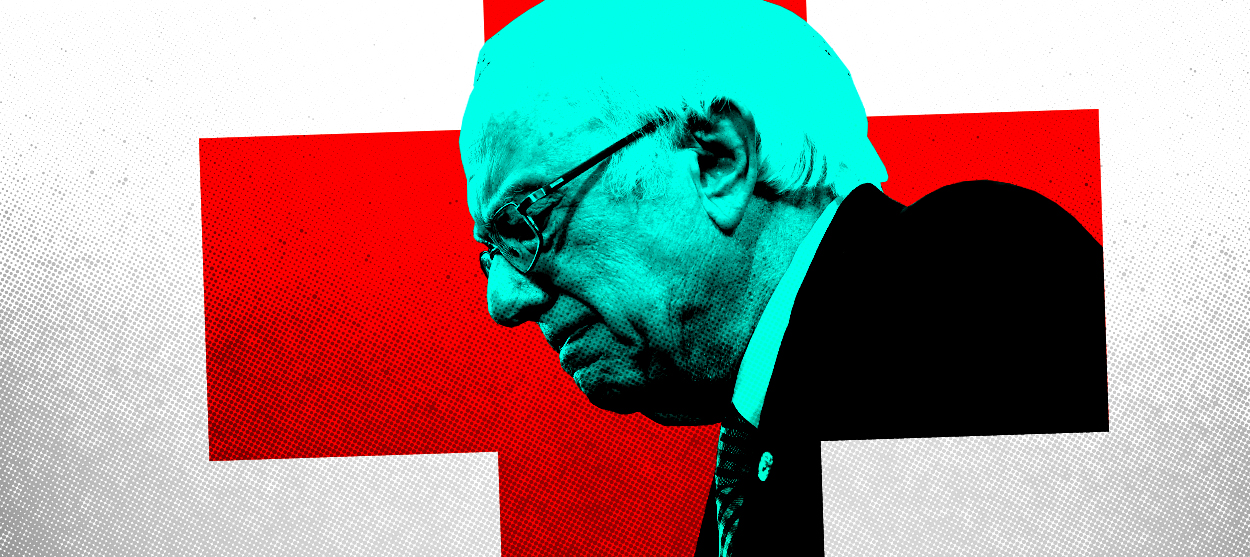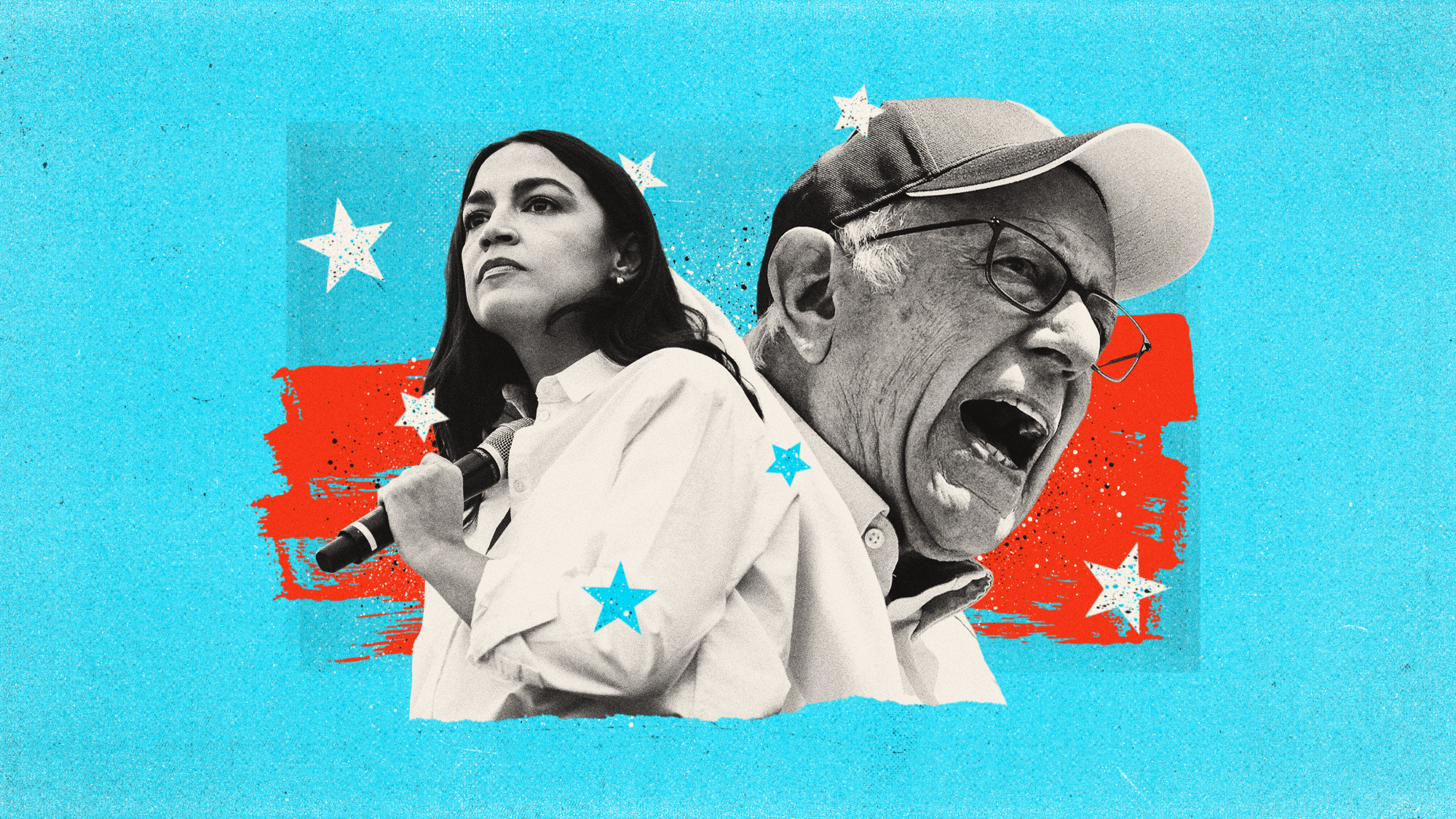Who cares about Bernie Sanders' medical records?
We don't need them — not from him or any other candidate


A free daily email with the biggest news stories of the day – and the best features from TheWeek.com
You are now subscribed
Your newsletter sign-up was successful
In the fall, Sen. Bernie Sanders (I-Vt.) said he thought "the people do have a right to know about the health of a senator, somebody who's running for president of the United States — full disclosure." Since then, however, he's changed his mind. "I think we have released quite as much documentation as any other candidate has," Sanders said Tuesday night, and when asked whether he'd release additional information, he replied, "I don't think we will, no." What we already have will have to suffice.
That seems good enough to me. The expectation that candidates will divulge their full health records is relatively new and not nearly as necessary as we've come to believe. President Trump's decision to flout the tradition with his bizarre, absurdly superlative doctor's notes in the 2016 race — one of them later revealed to be dictated by Trump himself — has had many rushing to insist we need presidential contenders' medical reports. It's a defense unworthy of our time.
The history of public demand for information on potential presidents' health is brief. For much of American history, the president's health was mostly his own business. Illness on occasion was even actively concealed from the public, like when Woodrow Wilson's wife, Edith, significantly governed in his stead from 1919 to 1921 after he had a serious stroke. Likewise, John F. Kennedy's campaign denied his Addison's disease during the 1960 election.
The Week
Escape your echo chamber. Get the facts behind the news, plus analysis from multiple perspectives.

Sign up for The Week's Free Newsletters
From our morning news briefing to a weekly Good News Newsletter, get the best of The Week delivered directly to your inbox.
From our morning news briefing to a weekly Good News Newsletter, get the best of The Week delivered directly to your inbox.
In the 1990s, however, a convergence of events created a new attention to presidential health, a sense that it ought to be public knowledge. First, former Sen. Paul Tsongas (D-Mass.) ran in the 1992 Democratic primaries after undergoing treatment for non-Hodgkin's lymphoma the decade before. Tsongas was open about his cancer survival, using it to talk about health-care policy and running ads emphasizing his good health.
Tsongas ended his bid in March of that year, and in December, a mere month after he could have been elected had he become the nominee, he revealed he had a "small, reportedly cancerous growth in his abdomen." Just over four years later, he was dead from surgery complications related to his new round of cancer treatment. "He started chemo the day he would have been inaugurated had he been elected," Rose McDermott, a University of California political scientist, told NPR. "He would have died in office."
While Tsongas was ill, in 1994, former President Ronald Reagan revealed his Alzheimer's disease diagnosis in a public letter, raising questions about the state of his health before he left the White House six years prior. His fellow former president, Jimmy Carter, responded by suggesting in the American Medical Association's weekly journal that the "great weakness of the 25th Amendment is its provision for determining disability in the event that the president is unable or unwilling to certify to impairment or disability," proposing independent physicians might do so instead.
Carter's idea, which likely would have required a constitutional amendment, never went anywhere, but presidential candidates sharing health records became the norm — particularly with older candidates, like Sen. John McCain (R-Ariz.) in 2008. Trump refused to comply in 2016, and now we find ourselves with an extraordinarily old slate of contenders: Sander is 78, as is former New York City Mayor Michael Bloomberg. Former Vice President Joe Biden is 77 (however much he tries to hide it); Trump is 73; Sen. Elizabeth Warren (D-Mass.) is 70. The likely general election race per current forecasts would have us choose between Sanders and Trump without complete medical records for either.
A free daily email with the biggest news stories of the day – and the best features from TheWeek.com
That's okay. We lasted two centuries as a country without full presidential health info; we can do it again. Modern media and communication technology make effective concealment of presidential ill health increasingly impossible: We know when Trump goes to the hospital, and we would definitely know if Melania were playing shadow president for her incapacitated husband. The sort of secrecy JFK could enjoy, the way FDR was often able to avoid being photographed in his wheelchair — that's no longer feasible for any president. Moreover, it's not unreasonable for candidates to want to retain some privacy, to keep confidential medical information that is embarrassing but irrelevant to their fitness for office.
And if we're not unduly fixated on installing a single, idealized person in the Oval Office — if we haven't bought into the personality cult undergirding Trump's "I alone can fix it" — the prospect of a president's hand-picked partner taking over for a season or even the rest of a term shouldn't strike us as catastrophic. (One of the most telling parts of Trump's impeachment trial was his Republican defenders' disinterest in ceding power to Vice President Mike Pence, an experienced politician with a long record of GOP orthodoxy who would probably be a more effective policymaker than Trump.) That's why we have vice presidents.
Yet the strongest argument against insisting on candidates' medical records, to my mind, is the unrealistic expectation of certainty it entails. We don't and can't know what the next four years will bring. A clean bill of health for a candidate we like guarantees us nothing. A surprise heart attack or cancerous growth, a freak accident, some new illness brought on by the stress of the office — all these are possible even if the candidate is in good health now. They are especially possible with candidates this elderly. Past 70, even people in "astonishingly excellent" health, as Trump's letter put it, will likely have some health problems. Memento mori, after all.
Want more essential commentary and analysis like this delivered straight to your inbox? Sign up for The Week's "Today's best articles" newsletter here.
Bonnie Kristian was a deputy editor and acting editor-in-chief of TheWeek.com. She is a columnist at Christianity Today and author of Untrustworthy: The Knowledge Crisis Breaking Our Brains, Polluting Our Politics, and Corrupting Christian Community (forthcoming 2022) and A Flexible Faith: Rethinking What It Means to Follow Jesus Today (2018). Her writing has also appeared at Time Magazine, CNN, USA Today, Newsweek, the Los Angeles Times, and The American Conservative, among other outlets.
-
 How the FCC’s ‘equal time’ rule works
How the FCC’s ‘equal time’ rule worksIn the Spotlight The law is at the heart of the Colbert-CBS conflict
-
 What is the endgame in the DHS shutdown?
What is the endgame in the DHS shutdown?Today’s Big Question Democrats want to rein in ICE’s immigration crackdown
-
 ‘Poor time management isn’t just an inconvenience’
‘Poor time management isn’t just an inconvenience’Instant Opinion Opinion, comment and editorials of the day
-
 The billionaires’ wealth tax: a catastrophe for California?
The billionaires’ wealth tax: a catastrophe for California?Talking Point Peter Thiel and Larry Page preparing to change state residency
-
 Mamdani vows big changes as New York’s new mayor
Mamdani vows big changes as New York’s new mayorSpeed Read
-
 Bari Weiss’ ‘60 Minutes’ scandal is about more than one report
Bari Weiss’ ‘60 Minutes’ scandal is about more than one reportIN THE SPOTLIGHT By blocking an approved segment on a controversial prison holding US deportees in El Salvador, the editor-in-chief of CBS News has become the main story
-
 Has Zohran Mamdani shown the Democrats how to win again?
Has Zohran Mamdani shown the Democrats how to win again?Today’s Big Question New York City mayoral election touted as victory for left-wing populists but moderate centrist wins elsewhere present more complex path for Democratic Party
-
 Millions turn out for anti-Trump ‘No Kings’ rallies
Millions turn out for anti-Trump ‘No Kings’ ralliesSpeed Read An estimated 7 million people participated, 2 million more than at the first ‘No Kings’ protest in June
-
 Ghislaine Maxwell: angling for a Trump pardon
Ghislaine Maxwell: angling for a Trump pardonTalking Point Convicted sex trafficker's testimony could shed new light on president's links to Jeffrey Epstein
-
 The last words and final moments of 40 presidents
The last words and final moments of 40 presidentsThe Explainer Some are eloquent quotes worthy of the holders of the highest office in the nation, and others... aren't
-
 The anger fueling the Bernie Sanders and Alexandria Ocasio-Cortez barnstorming tour
The anger fueling the Bernie Sanders and Alexandria Ocasio-Cortez barnstorming tourTalking Points The duo is drawing big anti-Trump crowds in red states
